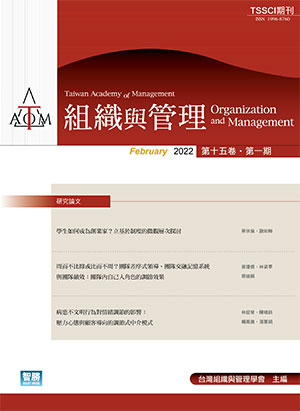Hot News
| 中文篇名 |
學生如何成為創業家?立基於制度的微觀層次探討 | |
|---|---|---|
| 英文篇名 |
How a Student Become an Entrepreneur? An Institutional Micro-level Process Analysis | |
| 作者 | ||
| 中文摘要 |
創業家身處的制度脈絡關乎其創業行為的展現,然而,既有研究僅探討創業家如何辨識機會,或是創業家如何順從或改變鉅觀制度,對於創業家與制度之互動動態討論卻十分有限。為了填補此一研究缺口,本研究採取制度的微觀層次分析,探究學生如何成為創業家。我們長期追蹤觀察一學生創業團隊,分析他們如何在經歷多元的創業育成制度下,使其新創事業逐漸穩健運作(2013~2018年)。本研究首先歸納出學生創業家與創業育成制度共同建構出的四種社會互動,包含「威權—順從」、「橋接—利用」、「需求—驗證」與「競爭—學習」。再者,不同於過去鉅觀制度觀點認定人們在制度性安排下理所當然成為創業家,本研究指出,行動者為了解決創業實務的困境,試圖鬆解微觀的互動秩序,才逐漸展現出創業家的身分認同。本研究的貢獻在於,從制度的微觀層次探討創業現象,彰顯出人寓居於制度的能動性,填補既有鉅觀與微觀創業研究之不足。 | |
| 英文摘要 |
Despite the central role of institutional contexts in the entrepreneurial process, extant researches pay little attention to the interactions between entrepreneurs and institutions. To fill the research gap, the study explored how a student becomes an entrepreneur by examining social interactions between student entrepreneurs and entrepreneurship education at the micro level. We conducted qualitative research on a case of student entrepreneurship by tracing the process of a start-up that is embedded in multiple institutional logics (2013-2018). The research results reveal four forms of social interactions: “commanding-conforming,” “bridging-exploiting,” “demanding-verifying,” “competing-learning”. Furthermore, in contrast to the macro-institutional discourse in which that students took entrepreneurial identity for granted due to homogeneity, the study depicts that students identify themselves as entrepreneurs by releasing interaction orders. Drawing on an institutional perspective at the micro-level process, the study fills the gap between macro- and micro-entrepreneurship researches. | |
| 關鍵詞 |
制度的微觀基礎、社會互動、創業育成、創業家、競賽邏輯與市場邏輯、microfoundations of institutions、social interaction、entrepreneurship and incubation、entrepreneurs、logics of contest vs. logics of market | |
| 刊名 | ||
| 期數 | ||
| 起訖頁 |
001-044 | |
| 出版單位 | ||
| DOI | ||
| QRCode |
| |
| 下一篇 |



